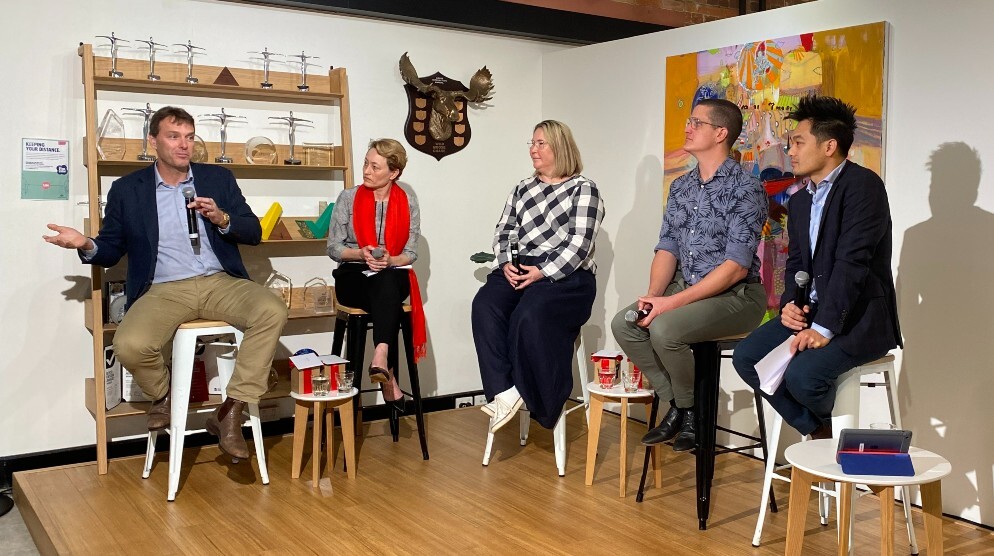Two days before the federal election, our Future Led panel tackled energy security. The conversation covered the macro and the micro; from the transition of our economy to the individual behaviour changes needed to create a secure and equitable energy future.
The following week, our new Prime Minister said climate change was “not just about the environment, it's about the shape of our economies but also our national security going forward.”
Since then, the conversation about energy security has only gotten bigger.
What I learnt from this Future Led event was that there are many people already thinking about energy security and the solutions we’re going to need as a nation and as individuals.
What do we mean by energy security?
Here’s what Kellie Charlesworth, who works in energy transition and sustainable futures at Arup, told us:
“Yes, we’re trying to get away from fossil fuels but that is what our system is using at the moment, and we’re very vulnerable to that, being cut off from those supplies,” she said.
“Looking forward, what does our system look like in 2050? We need to think about a resilient energy system. It's important for everything we want to achieve.
“At the moment we have a variety of things we use for energy – electricity, gas, petrol, for example. Into the future, relying on just one thing, like electrification, is very risky.
“So thinking about that into the future, what are these energy sources we will use, complementary to electricity?”
How can technology and behaviour changes help us through this transition?
At Liquid, we work on projects that include creating sustained behaviour change, which often involves designing digital services that support high-stakes decisions and long-term behaviour of individuals.
Carl Tidemann, a senior researcher in climate solutions at the Climate Council, told us that population-level behaviour changes would be needed – be they forced or voluntary.
“There’s technologies on the way that are carbon negative, they’re not pumping carbon dioxide back into the ground, they’re creating new materials or other things. There’s a lot going on and I do feel positive,” he said.
“There will be changes to our lifestyles and it will come from crunches rather than being voluntary. It will be price, because prices will probably go up quite a lot before we see prices come down.
“There will need to be behaviour change. I don't think we’ll be able to keep living the way we currently do, which I think is fairly flippantly, particularly in high-income countries. Making lifestyle changes can also benefit other things, such as your own health and saving money."

How do we manage transition in an equitable way?
For those who can afford it, making changes in your life might not cause too much disruption. But for many others, current options may be out of reach.
Angela Heck, from The Next Economy, said technical and digital solutions combined with relevant policy would be needed over the coming decades to make transition equitable.
“There are so many issues around equity within Australia to address. How do we make energy affordable for everyone? For those who are renting, what is the solution?
“I'm lucky enough to have a house, I’ve got solar on it … but what about those that can’t afford solar? What about those who are renting, who currently don’t have options?”
For example, Angela added, rooftop solar gardens, which allow those in apartment blocks to share in the benefits of solar power, could be the solution to help renters.
“What we’re going to see in this transition is: this is the future, but it might be done in different ways with different technology and digital solutions.”
Everyone, everywhere
It was fascinating to think back to this Future Led conversation in the days following the election.
These final thoughts from Matt Rennie, who provides strategic and commercial advice to business and investors as they navigate the transition to net zero, feel kind of prophetic now.
“We’ve really got to do something as a country because we’re part of a tapestry, an ecosystem that needs to do something,” he said.
“We’ve got to do something to help everyone because there will be a cascading impact, which won’t begin with us, it will begin with Pacific islands not being there anymore.
"We do actually have to do something. It’s not resolved. This will take action from everybody.
“Political people don’t change. What happens is our kids, your kids, the next wave is going to drive this change and we’ve all got to get behind it because it’s not economic until it’s too late.”
More from our Future Led series:
